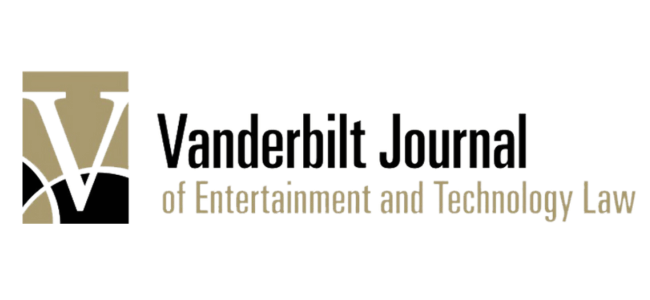Overview
The Vanderbilt Journal of Entertainment and Technology Law publishes four times a year (Spring, Summer, Fall, and Winter). We have two selection cycles (spring and fall) per year. We also publish Blog posts authored by current Vanderbilt Law students on topical current events.

How the Law Makes Smart Cities Unaccountable, and How to Start Making It Better:
Lessons from Sidewalk Toronto
This Article demonstrates that the interplay between data protection law and public and private governance structures that govern smart city projects around the world are crucial to guarantee smart cities safety and trustworthiness; and for cities to be able to harness their benefits. In doing so, this Article calls for not only reform of data governance law, but also reform in other fields of law better equipped with dealing with the power asymmetries and particularities of the sectors where digital technologies are being adopted. This Article focuses on cities and how local law and governance should be adapted to address these risks.
David S. Lee & Felicia F. Chen | Article
Governing Global Gig Platforms in the Age of AI: When the Manager is an Algorithm
This Article examines the intricate interplay among algorithmic discrimination, corporate governance, and growing global legal scrutiny to protect gig workers and govern AI. This emerging legal and regulatory framework from the European Union has the potential to align platforms’ incentives with gig workers’ rights. Finally, this Article offers policy recommendations and actionable organizational changes for platforms.
Jonathan Peters & Skylar Bandoly | Article
Applying the Public Forum Doctrine to Public Official and Campaign Social Media Accounts
This Article reviews these and related cases to explore—in the context of public forum analysis—how courts have addressed the personal social media accounts of public officials and the campaign accounts of candidates running for elected office, particularly if the candidate is running for re-election. This Article also offers several proposals regarding how courts should address such accounts.
Mary Margaret Burniston | Note
State and Regulatory Agency Approaches to Limiting Deepfakes in Political Advertising
As deepfakes in political advertisement present the clearest threat of electoral confusion and deception, lawmakers should focus on deepfakes and craft content-neutral regulations of the manner of speech that can be used in AI-generated political advertisements. Such regulations would advance the strong government interest of preventing misrepresentation and electoral confusion.
Blog Posts

Submissions
Submissions for our journal are currently closed.
The Vanderbilt Journal of Entertainment and Technology Law publishes four times a year. We have two selection cycles (spring and fall) per year. During a selection cycle, we accept submissions on a rolling basis. We do not accept submissions solely authored by law school students. We also do not publish student authors besides Vanderbilt student Notes
Inquiries and Information
Vanderbilt University Law School
131 21st Ave S. Nashville, TN 37203
615-322-5600 Email